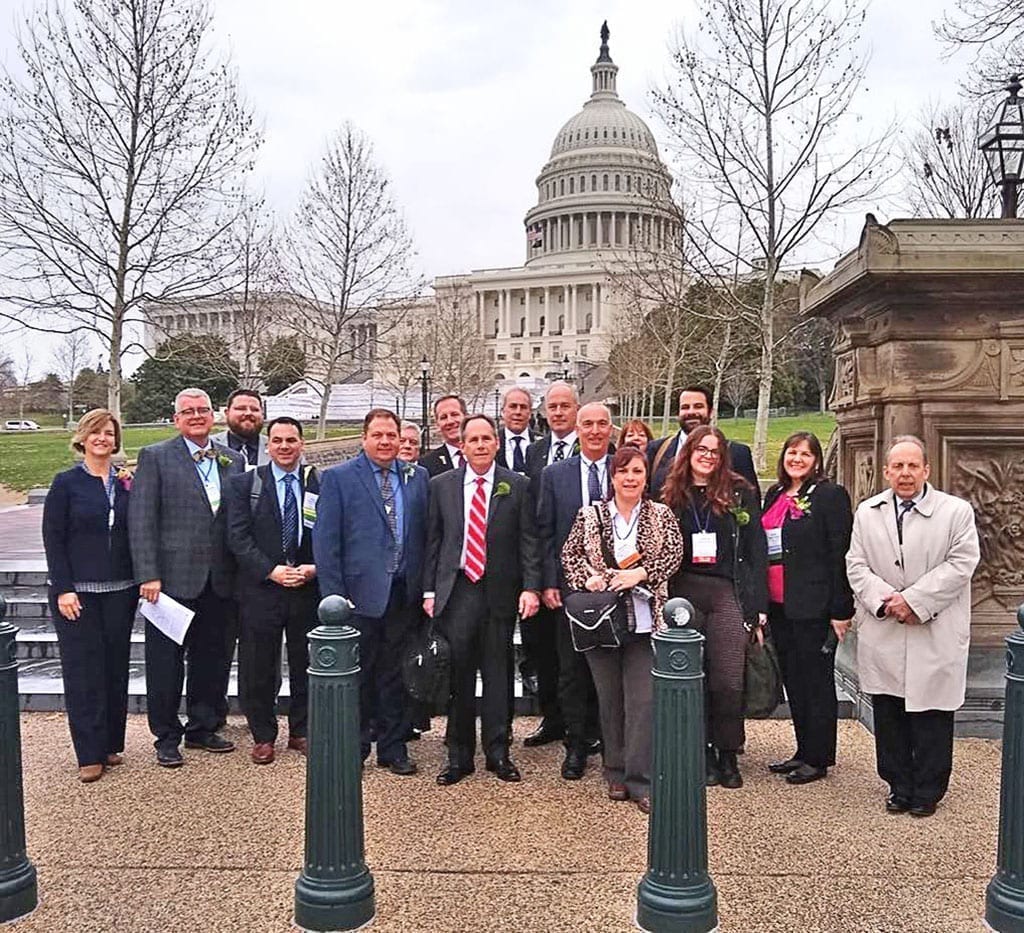
Attendees at SAF’s 40th Annual Congressional Action Days in 2020, getting ready to meet with their legislators. The 2021 Congressional Action Days will be held virtually.
As the Biden-Harris Administration moves forward with its legislative and regulatory agenda, the Society of American Florists is making sure floriculture’s needs are heard loud and clear. On April 13-14, floral industry members will gather virtually in dozens of meetings with the key decision makers on Capitol Hill as part of SAF’s annual Congressional Action Days.
Typically held in person, this annual event is an opportunity for the floral industry to show Capitol Hill the strength and heft of the industry. During this year’s virtual event, attendees will zero in on four key issues: immigration reform, research funding, cost savings on imports and maintaining the minimum wage. Through a series of targeted virtual meetings, growers, wholesalers, retailers and suppliers participating in CAD will educate Congress and key staffers on the Hill and in federal agencies on why these issues are important to floriculture. Here’s a quick recap of the issues:
Floriculture & Nursery Research Initiative: More Research Funding
What We’re Asking: Congress to increase its financial support for FNRI by $1 million.
The Backstory: FNRI is a federally funded program through the USDA’s Agricultural Research Service (ARS). It was initially conceived by the industry in the 1980s with the intent to help guide and support floriculture and nursery research priorities.
Why Our Industry Needs It: FNRI is vital to our efforts to respond to pest and disease challenges, enhance the efficiency and sustainability of our production practices, and broaden the message of the positive environmental and social impact of our crops. With the appropriate resources, FNRI can play a significant role in the floriculture industry’s pursuit of reducing crop inputs and cutting greenhouse gas emissions (GHGs) throughout the supply chain.
General System of Preferences Reauthorization: Cost Savings on Imports
What We’re Asking: Congress to take immediate action to renew GSP.
The Backstory: The Generalized System of Preferences (GSP) has been in place for more than 45 years, promoting opportunity for the least economically developed countries abroad and supporting U.S. businesses that rely on imported products to sustain and grow their businesses.
Why Our Industry Needs It: U.S. floral retailers have benefitted greatly from duty-free imports of cut flowers both through trade agreements and GSP. Nearly 80% of cut flowers purchased in the U.S. are grown in other countries and almost 95% of those imported come from countries where relief from duties is applied. For local and family-owned floral shops and wholesalers who are facing increased pressures through state actions on minimum wage, increased costs of healthcare and other challenges, the cost savings through duty-free imports are significant to the health of their business and thus the industry.
Duty free status has resulted in about $40 million per year staying in the floral industry rather than being diverted to federal coffers, a number expected to increase significantly with the recent addition of roses to GSP eligibility list. These are dollars that are used to hire additional staff, promote consumer purchases, and invest in the future of family businesses. However, GSP’s authorization expired on Dec. 31, 2020, and must be renewed if the duty-free status and business certainty it provides for fresh cut flowers and other products is to be reinstated.
Maintain the Minimum Wage
What We’re Asking: Congress should maintain the minimum wage. This is not the right time for a federal increase, as it will only stunt the recovery of the floriculture industry.
The Backstory: The recently introduced Raise the Wage Act of 2021 would increase the federal minimum wage to $15.00 per hour over 5 years and provides for further increases in subsequent years. Congress should not saddle small business owners with this significant cost increase, especially not now at a time when small businesses are confronted with the worst pandemic in more than 100 years, with 25 percent of small business owners reporting that they will have to close their doors if current economic conditions do not improve.
Why Our Industry Needs It: Businesses in the floriculture industry have very narrow profit margins and cannot absorb increased labor costs. Floral industry businesses often pay in excess of the minimum wage to attract and retain valuable employees. An increase in the federal minimum wage would create an upward pressure on those already-higher wages and may prove to be unsustainable. Floral business owners know that more than doubling the federal minimum wage will require many to reduce their labor force, cut business investments and, for some, cause them to close their doors.
Ag Labor and Immigration: Preserve Agriculture’s Workforce
What We’re Asking: Congress must take action to pass legislation that preserves agriculture’s experienced workforce and provides for agriculture’s future needs with a flexible, market-based agricultural worker visa program that allows access to a legal and reliable workforce moving forward.
Why Our Industry Needs It: The devastating labor shortage is impacting flower growing operations today and jeopardizes the future success of the floriculture sector and the vitality of rural economies, which rely upon agriculture as a primary economic driver. Small- and medium-sized growers are at a critical juncture caused by the margin between profitability and loss due to the labor-intensive nature of this sector and misguided federal policy on agricultural labor. The impact goes far beyond the farm gate, as each on-farm employee supports two to three other jobs up and down the food and agriculture supply chain.
Mark your calendar for April 13-14 and look for more details coming soon from SAF on how to sign up to share your story with key lawmakers and staff.
Katie Butler is the senior vice president of the Society of American Florists.

